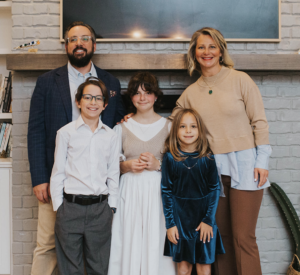 By Emily Silberman
By Emily Silberman
As parents, we often ask ourselves, “Am I making the right decisions?” We navigate all sorts of difficult situations and discussions with our kids, and place tremendous burdens on ourselves to be perfect, exemplary role models for them.
While none of us are perfect, there is one “easy” way to impart our values onto our children and inspire them to be better people — by getting them involved in charity.
As Jewish parents, we have the unique privilege (and responsibility) of inspiring our children to be torch bearers for global Jewry. The easiest decision I ever made for my children was taking the Jewish Future Pledge, which promises that half of all charitable donations in my will are earmarked for Israeli or Jewish causes. By taking this pledge, I know I’m helping to build a legacy that I can be proud of — for my children, grandchildren, and the future of our people.
If there’s one thing that all of us in the Jewish community can agree on — and there aren’t too many of those — it’s that the winds of change are blowing for the State of Israel. Surveys find that as many as 25% of young Jews believe that Israel is “an apartheid state.” Perhaps most worrisome, 38% of Americans accuse Israel of having “too much influence” over US politics. Support for the world’s only Jewish state is declining among key demographics. Therefore, it’s more important than ever that we continue to encourage our children to connect with their Jewish identity through the lens of Israel.
As a Jew by choice, I have seen firsthand the Jewish people’s commitment to philanthropy, equality, and tolerance. So, it’s concerning to me to see that so many people misunderstand the Jewish state and Jewish people. And it worries me that, as a result, our young people won’t perpetuate the cultural and religious values of the Jewish people — gratitude, togetherness, and giving back to community, just to name a few.
I want to live these values and impart them on my children, so that they may have access to the richness and diversity of Jewish life, enabling them to live as Jews, and proudly carry those traditions into the future.
Supporting Jewish institutions is essential to preserving the Jewish way of life for future generations. Our history, knowledge, and culture are foundational to ensuring Jewish continuity. Think of your most treasured Jewish memories: bar or bat mitzvahs, summer camp, holidays, visits to Israel with your family. We cannot lose these traditions, and by committing to the Jewish Future Pledge, I know that I’ve played a role in securing these glorious moments for the Jewish children of the future.
Committing to the Jewish future is also my way of modelling tzedakah — the ethical obligation to charitable giving — for my children. I want them to understand that philanthropy isn’t just for the wealthy; we all can, and should, give back. I want them to remember me as a good mother, who raised decent and selfless people, people who are grateful for what they have and who strive to share those blessings with others.
But I also did it because it’s never too early to start a conversation with your children about the importance of the Jewish community and Jewish values.
I want my children to realize that the Jewish future begins now. When we bring our children to volunteer at food pantries, help them raise money for Jewish charities, and encourage them to make food baskets for the less fortunate, we show them some of the ways to make a lifelong commitment to helping others, and inspire them to continue on their own.
By modeling the charitable behavior we want our children to emulate, and involving them in those activities, we can help them to realize how much power they have in making a difference in the world. And the best part is, no act is too small! We just have to take the first step. By doing so, we can help them realize that the Jewish future is their future as well as our own, and that we all have the power to preserve it.
Emily Silberman has run logistics missions in the US Army, tackled the unique needs of the underbanked population, and launched, led, and exited a CPG (Consumer Packaged Goods) start-up. Now, she is embarking on a new venture: finding great investment opportunities in companies led by women founders and founders of color. Emily is married with three great kids and a puppy.

